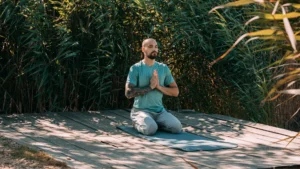Anxiety is different from occasional worry. It can feel like constant fear, stress, or discomfort that makes it difficult to think clearly, sleep well, or even feel safe. While there’s no quick and effective treatment for anxiety, regularly being kind to yourself can alleviate symptoms and help keep your emotions in check.
Taking care of yourself when you’re anxious doesn’t mean running away from your feelings. It means taking time to calm down, process your emotions, and connect with your body. Even if you deal with anxiety daily or are going through a particularly difficult time of year, gentle self-care can help you stay calm and find inner peace.
Understanding the Mind-Body-Anxiety Connection
The stress response, also known as the “fight or flight” response, is triggered by anxiety. Even when there’s no immediate danger, your muscles tense, your heart races, and your breathing quickens. Over time, chronic worry can make it difficult to concentrate, digest food, and sleep.
That’s why gentle self-care is so important. Your body learns it’s safe when you do things that calm your nervous system, like mindful movements, breathing exercises, and healing breaks. This takes you out of “survival mode” and into a more stable, healthier state.
According to the National Institute of Mental Health, anxiety disorders are among the most common mental health conditions. Fortunately, they’re also easily treated. Making your mental health a priority in your daily life is an important first step toward recovery.
How do you know if you need more self-care?
While everyone has their own way of dealing with worries, here are some common signs that you might need to take a break and take better care of yourself:
You always feel like you have too much to do, even the little things.
- You often experience headaches, stress, or stomach upset.
- You have trouble falling asleep or feel worn out when you wake up.
- You feel disconnected from others or avoid social situations. You worry excessively or, in the worst case scenario, dwell on things.
If you’re experiencing these symptoms, it might be time to relax and take care of your mental health.
Gentle self-care can help alleviate anxiety
Self-care varies. It’s better to do things that calm you down rather than things that make you feel more alive when you’re struggling with anxiety. It’s not about “fixing” your mind or keeping yourself busy; it’s about making your body and mind feel safe and supported.
- Conscious breathing: Breathing is one of the simplest ways to manage stress. When you breathe deeply and slowly, your brain learns that you’re safe. Try inhaling for four seconds, holding your breath for four seconds, and exhaling for six seconds. Repeat this several times. This will instantly calm you down by resetting your nervous system.
- Intensive exercise: is good for some people, but slow walking, yoga, or stretching can be more beneficial for others. Moving your body helps your mind focus on the present while simultaneously releasing stress.
- Calmness Exercises: When worries have you thinking about the future, these exercises can help you return to the present. Make a list of five things you can see, four things you can touch, three things you can hear, two things you can smell, and one thing you can taste.
- Creating art: listening to music, or writing a book are all great ways to cope with anxiety without talking about it. Letting your thoughts flow onto paper or a piece of art can be incredibly therapeutic.
- Nourishing Rest: Take advantage of ways to rest other than sleep. Take a warm bath, listen to music that makes you feel better, or simply sit quietly with a cup of tea. Doing these small things teaches your brain that it’s okay to slow down.
Comparing High-Stress vs. Calming Self-Care
| Scenario | High-Stress Coping | Gentle Self-Care Alternative |
|---|---|---|
| Overthinking at night | Scrolling social media | Deep breathing or journaling |
| Feeling anxious in public | Avoidance or isolating | Slow breathing or grounding technique |
| Physical tension | Ignoring or pushing through | Gentle stretching or warm shower |
| Feeling overwhelmed | Multitasking to stay distracted | Taking a mindful 10-minute break |
| Emotional shutdown | Bottling emotions | Expressing through art or journaling |
How to Create a Gentle Self-Care Routine
A self-care routine that supports anxiety doesn’t have to be elaborate. What matters most is that it feels safe, manageable, and tailored to your needs.
Start by choosing one or two practices that feel natural to you. Set aside a few minutes each day—morning, afternoon, or evening—where you check in with your body and emotions. Ask yourself, “What do I need right now?” and honor that answer, even if it’s just to rest or take a few breaths.
Over time, your routine can expand and evolve. The more consistently you show up for yourself, the more your body learns to trust that it’s okay to relax and let go.
When to Seek Extra Support
Self-care is powerful, but it’s not a substitute for professional help. If anxiety is interfering with your daily life, relationships, or work, consider speaking with a licensed therapist or counselor. Therapy offers tools, insights, and support that can help you address the root of your anxiety.
There’s no shame in asking for help. In fact, combining therapy with gentle self-care practices is one of the most effective ways to manage anxiety long-term.
FAQs About Managing Anxiety with Self-Care
Can self-care really help with anxiety?
Yes. While it may not eliminate anxiety entirely, consistent self-care can reduce symptoms, improve coping ability, and increase emotional resilience.
What if I don’t have time for self-care?
Even five minutes of breathing, a short walk, or writing in a journal can make a difference. Self-care is about quality, not quantity.
Is it okay to rest when I’m feeling anxious?
Absolutely. Rest is one of the most healing responses to anxiety. It helps your nervous system reset and your mind slow down.
What’s the best time to practice self-care for anxiety?
Any time you feel anxious is the right time. That said, building self-care into your morning and evening routines can prevent anxiety before it builds up.
Should I avoid all stress?
Not necessarily. Some stress is part of life. The key is learning how to regulate your nervous system and recover through rest, reflection, and support.
Conclusion: A Gentle Path to Inner Calm
Managing anxiety isn’t about forcing yourself to “get over it.” It’s about meeting yourself with care, curiosity, and compassion. Gentle self-care practices offer a way to ground your body, quiet your mind, and create safety when everything feels overwhelming.
By listening to your needs, building supportive habits, and making space for rest and reflection, you can build resilience and calm—one day, one breath, one moment at a time.
References
- National Institute of Mental Health – Anxiety Disorders
https://www.nimh.nih.gov/health/topics/anxiety-disorders - Anxiety & Depression Association of America – Tips to Manage Anxiety
https://adaa.org/tips - Mayo Clinic – Anxiety Disorders and Self-Care
https://www.mayoclinic.org/diseases-conditions/anxiety




